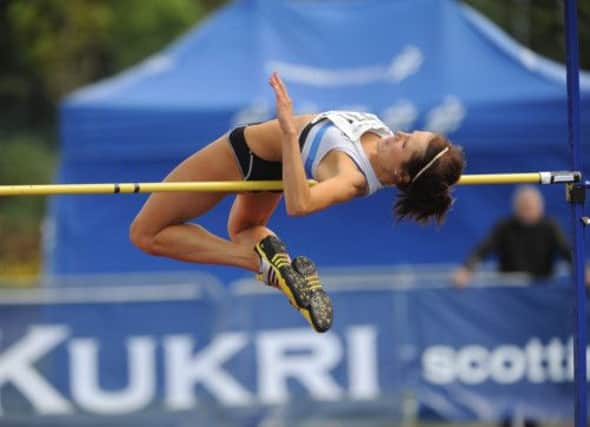Commonwealth Games: Jayne Nisbet has high hopes


When Jayne Nisbet climbs into her dramatic leap in front of a captive audience in Hampden Park next summer, she will do so with considerable power to inspire. But that is a responsibility she has become accustomed to.
Nisbet, 24, relieved herself of a heavy burden earlier this year when she told how her career had been framed by a continuous battle with an eating disorder. Whenever somebody told her she looked healthy, she thought they were implying that she looked fat. Mercifully, she can now see the absurdity of that delusion.
Advertisement
Hide AdAdvertisement
Hide AdAnd now that she has gone public with her ordeal, the Loughborough-based Scot has realised that she is one of many athletes, and many high jumpers, to have suffered what she describes as “body image” problems. For Nisbet, worrying about her appearance led to her embarking on a diet that made it very hard to recover from training sessions, let alone compete in international events. And, just when she thought she had left all of her troubles behind her, regained her confidence and started to fulfil her potential, she had an accident in the gym that cut short a promising summer.
“It was 3 July and I was working out in the weights room when I fell from the top of a step-up box with 75kg on my back,” she says. “My spinal cord was badly bruised, my thoracic nerve was badly compressed and for five days I couldn’t do anything. I was very lucky, actually, because I thought it was going to be much worse. I’ve never been in so much pain in my life, and there was a bit of shock as well.
“I was gutted, obviously, to get injured – there were lots of emotions. I was having such a good year and it could have been much better if I hadn’t got injured. I thought I had broken my back, because I couldn’t move.”
All was not lost. Nisbet had already cleared the 1.80 metres she needed to qualify for her first Commonwealth Games six times, and she was duly named in the first tranche of selections last week. During her convalescence she sat down with the three coaches who comprise “Team Nisbet”, Graham Ravenscroft, David Parker and Grant Byrne, and thrashed out a 12-month programme to take her up to Glasgow 2014, which feels rather like the rainbow’s end. “Everything is mapped out, and I’m just excited now,” says the personal trainer from Edinburgh, whose enthusiasm reverberates down the phone line.
“I’ve got my little business and it’s always going to be there as something to fall back on. But I’m giving Glasgow everything. It’s a big thing for me and one of the main things that helped me get through hard times in the past. This was the big goal.”
Nisbet feels that British high jump is undergoing a minor resurgence after a number of years “when people just said it is rubbish”. Competition has even arrived from her own club, in the shape of Emma Nuttall, who jumped 1.87m to win the British Championships. “It’s nice to have that rivalry,” says Nisbet, “but, at the end of the day, I’m determined to be No 1, and it doesn’t matter what anyone else is doing.”
She trains two or three times a day in between servicing her loyal clientele as a personal trainer. Nisbet is making a lot of smart decisions now. Don’t rush back from injury, don’t worry about avoiding trouble when it will probably find you at the unlikeliest moment and don’t, above all, let the demons of self-doubt back in.
“What I went through made me mentally strong, and I can identify now with things that other people are going through and help them,” she says. “So many people have got in touch with me since I spoke about my eating disorder and said that it has inspired them to take a look at themselves and think ‘what am I doing?’.
Advertisement
Hide AdAdvertisement
Hide Ad“For me, it came to a head when the Commonwealth Games were on in Delhi in 2010. I took a look at myself and said: ‘You should be in Delhi, and one of the reasons you are not there is that you are not dealing with this.’ At that point, I decided to deal with it and get over it.
“It’s quite prevalent in sport, because so many people have issues with their body image. A lot of high jumpers have some degree of being aware of what they are eating at some point in their careers. You tell yourself: ‘If you are overweight, you are not going to jump as high’. A lot of coaches need to be careful about how they manage that.
“For me, a trigger word was ‘healthy’. Every time somebody said I looked healthy, my response was to think: ‘Oh my god, I look fat.’ But I think I have got a really good outlook on everything now.”